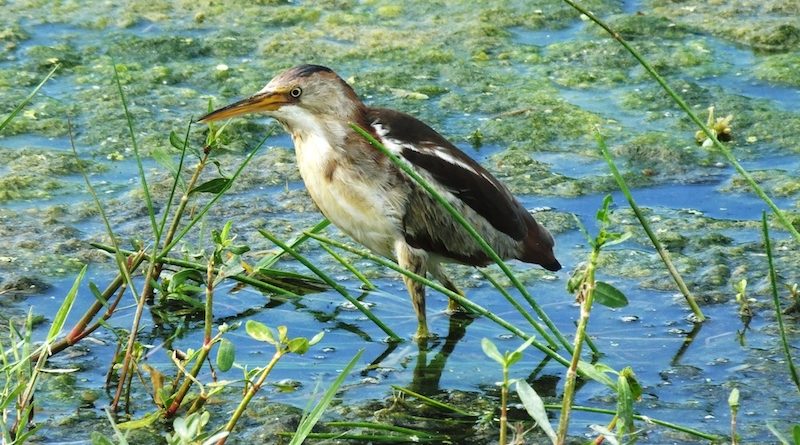Looking Inside the Labyrinth
More than 1,000 acres of marsh and forest lie at the mouth of the
Little Otter Creek in Ferrisburgh. And somewhere in there, lives the elusive least bittern.
BY LEATH TONINO
I’m obsessed with the labyrinthine marshland at the mouth of Little Otter Creek in Ferrisburgh. Labyrinthine? Yes. It really is a maze: of cattails, of sedges, of muskrat nests, of painted turtles, of narrow passages that just barely allow a kayak to squeeze through. What is it about getting lost in there that so intoxicates, so mesmerizes? I suppose, if I had to try to answer the question, I’d say it’s the possibility of the very lostness itself leading me to find something—something I’ve never seen before, something just around the corner, hidden in plain sight. Specifically, I’m thinking of the least bittern, a secretive, camouflaged heron that is, according to a Vermont Ecostudies publication, “rarely seen even by the most determined or fortunate observers.” Having spent countless hours exploring the marsh (one of only a few known bittern breeding sites in the state), it’s probably fair to call me “determined.” And yet, in years of floating around with a thermos of tea and my binoculars at the ready, both at dawn and dusk, I’ve never spotted a bittern. I’ve spotted otters, terns, pike, and raccoons—but no bitterns.
Does this leave me feeling glum? Like a failure? Does it make me want to give up the quest for a glimpse of this bird that, when alarmed, freezes with head and neck upright, thus blending in with the marsh’s vertical vegetation? Far from it. The search for the bittern keeps me coming back, coming back, coming back. It reminds me of these lines from the famous sculptor Henry Moore: “The secret of life is to have a task, something you devote your entire life to, something you bring everything to, every minute of the day for your whole life. And the most important thing is—it must be something you cannot possibly do.”
Well, I may be “determined,” but I can’t say I devote my entire life to this quest. And no, the quest isn’t theoretically impossible (eventually, at long last, I’ll glimpse the bittern). Nevertheless, Moore’s quote does resonate with me: in challenge, I discover meaning. Or, put another way: by not discovering the bittern, I discover the rest of the marsh—I discover the deep heart of the labyrinth, all those other critters, funky plants, and mesmerizing shifts of light and weather and mood. I discover ripples spreading from me in concentric circles, expanding to touch the encompassing habitat. I’m tempted to say that I discover the place itself.
Maybe my time has come and this summer I’ll actually spot the cagey bird. Maybe I won’t. Either way, I’m game to continue trying. A quest of this variety can never lead to failure, can only lead to an enriched and ever-enriching sense of home. In a way, the fact that the bittern remains a hermit, unseen and infrequently heard, actually defines the Little Otter marsh.
Places are always beyond us, always more complicated, always more nuanced. To know them completely is not to know them at all.
Ixobrychus exilis, elusive avian Vermonter, flora impersonator, shy sly slim denizen of the weird sprawling wetland, goad to micro-adventurers, reason to again dip the paddle and pull and glide, possibility—I salute you. Thanks for doing what you do, for being who you are, for keeping this world wild, mysterious, fun.
For keeping me coming back.
Featured Photo Caption: The secretive least bittern, shown here, somewhere in the labyrinth of a Vermont marsh, has a dovelike call. Courtesy photo.

